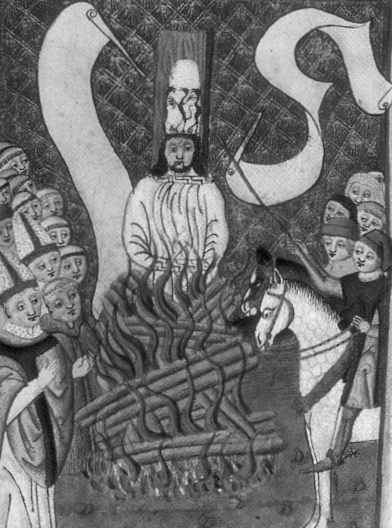Hussite: Difference between revisions
From Cunnan
Jump to navigationJump to search
mNo edit summary |
m (including image) |
||
| Line 14: | Line 14: | ||
* This picture, from a period source, shows [http://en.wikipedia.org/wiki/Jan_Hus Jan Hus] being burned at the stake: |
* This picture, from a period source, shows [http://en.wikipedia.org/wiki/Jan_Hus Jan Hus] being burned at the stake: |
||
[Image:Constance.jpg] |
[[Image:Constance.jpg]] |
||
== Your [[SCA]] [[Persona]] is a Hussite == |
== Your [[SCA]] [[Persona]] is a Hussite == |
||
Revision as of 01:26, 15 November 2003
A Hussite is a follower of the Bohemian preacher Jan Hus. Jan Hus was in turn a follower of the English professor John Wyclif.
The Hussites were an extreme (for their time) religious sect. They rejected papal authority and appointed their own priests and bishops. They rejected standards of the Roman Catholic Church such as celibacy of priests, etc. They agreed with the Lollards (and Wyclif) about using only the Bible as a source for their doctrine.
The Hussites were probably the most important pre-1517 reformation movement, from a [[Europe]an point of view.
References
- Hussites at wikipedia
- Jan Hus
- John Wyclif
- Lollard
- This picture, from a period source, shows Jan Hus being burned at the stake:
Your SCA Persona is a Hussite
- You live in Bohemia or Moravia, most probably during the early 15th century or possibly later in the 15th century or 16th century.
- You are probably very religious. You are familiar with the Bible but may not know a great deal about other religious writings such as the works of the scholastics.
- You probably live in the countryside, rather than the city.
- You could be from any social class. Although the bulk of the Hussite army was formed of peasants and it was often referred to as a peasant movement, there were leaders of the upper and middle social classes in the movement as well. The movement, like the lollards was partly religious and partly nationalist.
- You may or may not be well educated. The leaders of the movement were probably well educated. The common folk amongst the movement were not.
- You eschew the trappings of wealth, especially amongst the clergy. You probably dress modestly and expect those around you to do the same.
- You may or may not be literate.
